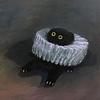Take a photo of a barcode or cover
adventurous
challenging
informative
slow-paced
Plot or Character Driven:
Plot
Strong character development:
Yes
Loveable characters:
No
Diverse cast of characters:
No
Flaws of characters a main focus:
Yes
First book I’ve ever read where there’s a chance the author wants to fuck a whale
challenging
informative
slow-paced
Plot or Character Driven:
N/A
Strong character development:
No
Loveable characters:
No
Diverse cast of characters:
Yes
Flaws of characters a main focus:
No
Thank god that’s over
This one I just couldn't make it through. And I got so caught up in his description of different species of whales that I was missing the point of the book. Maybe when I'm a more mature reader I can try again?
adventurous
dark
funny
inspiring
mysterious
reflective
tense
slow-paced
Plot or Character Driven:
A mix
Strong character development:
Yes
Loveable characters:
Yes
Diverse cast of characters:
Yes
Flaws of characters a main focus:
Yes
adventurous
challenging
informative
reflective
slow-paced
Plot or Character Driven:
Character
Strong character development:
No
Loveable characters:
Complicated
Diverse cast of characters:
Yes
Flaws of characters a main focus:
Complicated
The best literature, that which is most literary, most aesthetically and artistically pleasing, is that which recognized that the telling of a story is more important than the story itself.
While storytelling is a very human experience, common to all members of its race, most of that storytelling is focused on the stories and not the telling. When you come home and tell your family about the guy who cut you off in traffic today, you want the focus to be on the guy who cut you off, not yourself as you tell the story. Once you tell that story, your family doesn’t begin complimenting you on how you told the story and the interesting angle you approached it form but again the story itself.
But what sets great literature apart from these quotidian conversations is not the stories but the telling of these stories. This is the greatness of Moby Dick.
To best illustrate how this novel accomplished this greatness, I need look at only one chapter: Cetology. Cetology is the study of whales, dolphins, and porpoises, though the chapter named after the study only concerns itself with the first of those creatures as is the whole novel. More specifically the chapter is concerned with categorizing the size of whales.
All this chapter sets out to do is to categorize whales by their size, dividing them into different sizes. Already there is no story here. There is no conflict. There’s no guy cutting you off in traffic. Just the telling of facts. What makes this chapter exceptional is the telling. So how does Melville, via Ishmael, tell this “story” to us?
Well, in order to understand that, you would need to have a familiarity with the common methods of book binding contemporary to Melville’s era: Folio, Octavo, and Duodecimo. A folio is a book whose sheets of paper are folded only once in the middle, rendering two pages with large surface space. An octavo is a book where the paper is folded three times, producing more pages but less surface space. Duodecimo is when paper is folded into 12 leaves, the most pages with the least surface space.
Ishmael sorts whales into these three categories, with Folio whales being the biggest, Duodecimo the smallest, and Octavo in the middle, and the whales in each of these volumes are considered chapters of the volume. The whole joke and pleasure of the chapter is it’s framing, is it’s particular way of telling the story, and that’s the pleasure of literature in its purest form.
While storytelling is a very human experience, common to all members of its race, most of that storytelling is focused on the stories and not the telling. When you come home and tell your family about the guy who cut you off in traffic today, you want the focus to be on the guy who cut you off, not yourself as you tell the story. Once you tell that story, your family doesn’t begin complimenting you on how you told the story and the interesting angle you approached it form but again the story itself.
But what sets great literature apart from these quotidian conversations is not the stories but the telling of these stories. This is the greatness of Moby Dick.
To best illustrate how this novel accomplished this greatness, I need look at only one chapter: Cetology. Cetology is the study of whales, dolphins, and porpoises, though the chapter named after the study only concerns itself with the first of those creatures as is the whole novel. More specifically the chapter is concerned with categorizing the size of whales.
All this chapter sets out to do is to categorize whales by their size, dividing them into different sizes. Already there is no story here. There is no conflict. There’s no guy cutting you off in traffic. Just the telling of facts. What makes this chapter exceptional is the telling. So how does Melville, via Ishmael, tell this “story” to us?
Well, in order to understand that, you would need to have a familiarity with the common methods of book binding contemporary to Melville’s era: Folio, Octavo, and Duodecimo. A folio is a book whose sheets of paper are folded only once in the middle, rendering two pages with large surface space. An octavo is a book where the paper is folded three times, producing more pages but less surface space. Duodecimo is when paper is folded into 12 leaves, the most pages with the least surface space.
Ishmael sorts whales into these three categories, with Folio whales being the biggest, Duodecimo the smallest, and Octavo in the middle, and the whales in each of these volumes are considered chapters of the volume. The whole joke and pleasure of the chapter is it’s framing, is it’s particular way of telling the story, and that’s the pleasure of literature in its purest form.
adventurous
informative
slow-paced
Plot or Character Driven:
Plot
Strong character development:
No
Loveable characters:
No
Diverse cast of characters:
Complicated
Flaws of characters a main focus:
Yes
I don't know what's more remarkable- how much Melville managed to get right about whales, or how much he managed to get wrong. Either way, the man is second only to Victor Hugo when it comes to going on barely related informational tangents only loosely based in true facts.
I know it's a classic so it hurts to give it such a low rating, but I really had a hard time getting through the book and even paying attention as I read. I had to reread parts when I felt my attention drifting off and just reading like a zombie. I'm sure it is a classic for good reason, but I just wasn't a fan.
slow-paced
Plot or Character Driven:
Character
Strong character development:
No
Loveable characters:
No
Diverse cast of characters:
Yes
Flaws of characters a main focus:
Yes
A slightly entertaining short novel squeezed into a painfully-boring, unfocused, endlessly-meandering, marathon infodump about cetaceans.
challenging
funny
reflective
tense
slow-paced





